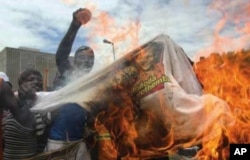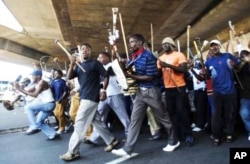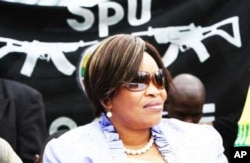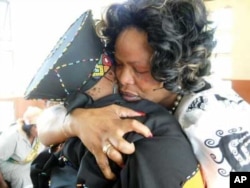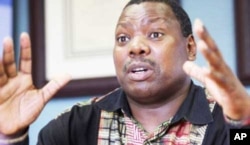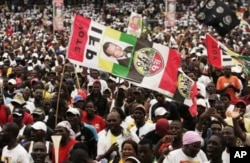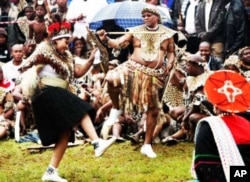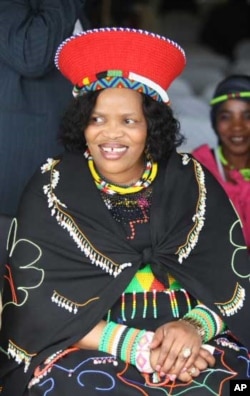This is Part 5 of a 5-part series: Municipal Elections in South Africa
Parts 1 / 2 / 3 / 4 / 5
Political observers consider South Africa’s KwaZulu-Natal province the country’s most volatile region. And the emergence of a new political party ahead of elections for town and city councils on May 18 has only served to increase tension in the area, which is home to most of South Africa’s 11 million Zulu people.
Traditionally, bloody election violence in KwaZulu-Natal has erupted between supporters of the African National Congress [ANC] and the Inkatha Freedom Party [IFP]. But just before these polls, senior IFP members have broken away to form the National Freedom Party [NFP].
“There’s a lack of trust among IFP supporters as to who is really loyal to the party and who is maybe sympathetic to this new party. There’s now a climate of conspiracy and confusion here,” said Zakhele Ndlovu, politics lecturer at the University of KwaZulu-Natal.
There’s ill-feeling between IFP and NFP supporters, and the ANC has faded into the background. Ultimately, though, say analysts, it’s the ruling party that will gain from the division within the IFP, with the municipal elections expected to provide the “final nail” in the “coffin” of the once-proud party.
NFP leader has ‘charisma’
The NFP says the IFP has launched “intimidation tactics” against it to stop it from campaigning in some areas of KwaZulu-Natal. “Stones have been thrown at our members’ houses and when we try to have meetings, people fire gunshots outside to try to scare us,” said NFP spokesman Andile Biyela.
The IFP denies targeting NFP members but has also appealed to its supporters to be “calm.”
“I think one of the biggest challenges we face in South Africa is that there’s a high level of political intolerance,” said Ndlovu. “And now, when we have a new [political] party and the tensions are very high, there is potential for violence. But hopefully the security forces will ensure that we don’t see any [further] violence,” he said.
The analyst added that “all over KwaZulu-Natal” members of both the IFP and the NFP are afraid of declaring their support for their parties “because they are fearful that if they do, they might find themselves in trouble….”
But Ndlovu added that there’s also “a lot of excitement” in the region. “A lot of people are waiting to see how the IFP is going to fare in these elections, given this split in its ranks,” he said.
Ndlovu remains convinced that the NFP will “take a lot of votes away” from the IFP on May 18. “Wherever the leader of this new party has been [visiting], there’s been a lot of support [for her],” he said.
Ndlovu is referring to Zanele Magwaza-Msibi, who in February quit her post as the IFP’s national chairperson to form the NFP. She’s also the former mayor of the Zululand district municipality.
“From what I know she did run the municipality very, very well; its finances are in order. So I think her record as a mayor is good,” said Ndlovu. “Also, the fact is that as [former] chairperson of the IFP, she has managed to get a lot of sympathy from IFP members. I think on paper, things look good for her. She comes across as someone who has good people skills, who seems to listen to people. Also, I must say, she has a lot of charisma.”
Defections weaken IFP
Because Magwaza-Msibi previously occupied such a powerful position within the IFP, said Ndlovu, she’s convinced several high profile political figures to abandon the IFP for the NFP. This represents a “further erosion” of the IFP in South Africa, which had slipped from gaining almost 11 percent of the national vote in the country’s first democratic elections in 1994 to just over four percent of the vote in the 2009 general polls, said the analyst.
“In the last ten years or so, the IFP has gotten weaker and weaker,” Ndlovu said. “They have not been doing well in recent elections. And now you have a party which is already weak, and it’s further weakened by a split in its ranks. This is going to cost the IFP dearly.”
He said the NFP is set to “do well” in some of what were previously IFP strongholds, and that this would “benefit the ANC more than any other party. I say this because if you look at the history of new political parties in South Africa, they are not able to sustain themselves.”
Just as the Congress of the People [COPE] party emerged to challenge the ANC in 2009 but failed, said Ndlovu, so he expects the NFP, despite initial gains, to “fade,” leaving the ANC the dominant political force in KwaZulu-Natal.
“This infighting between the NFP and the IFP really gives the ANC an opportunity to go and mobilize support while these two political parties are busy fighting,” he said.
ANC on the march
The head of the ANC’s campaign in KwaZulu-Natal, Nhlakanipho Ntombela, has reported that his party is “more free to campaign and electioneer” in parts of the province because “the IFP is focusing on making these areas no-go zones for the NFP, not us.”
But Ndlovu said “sympathy” had been building for the ANC in KwaZulu-Natal ever since 2007, when Jacob Zuma, a traditional Zulu elder who was born in a KwaZulu-Natal village, became president of the party.
“He always projects this image of being a strong Zulu traditionalist, with many wives, for example. So a lot of rural men, and those who live in urban areas but who are traditionalists, they identify with Zuma a lot. That has really helped the ANC to have a lot of appeal among voters (in KwaZulu-Natal),” Ndlovu explained.
Before Zuma’s ascension to the ANC presidency, he said, the organization was perceived as dominated by the Xhosa ethnic group, from the Eastern Cape province. Ndlovu said this perception resulted in many Zulus previously supporting the IFP. But Zuma had “really thrown a spanner into the IFP’s works,” he commented.
“If you look from 2007 up until now, the ANC has been able to really increase its support in the province. I think we’re going to see that trend continuing in these elections,” Ndlovu said.
Other analysts say what’s happening in KwaZulu-Natal is further evidence that only two political parties, namely the ANC and the main opposition Democratic Alliance, will dominate South Africa’s political scene in the near future.




